D2D Interview: Alain Passard

I had my first Michelin three-star experience this past September when I visited L'Arpege in Paris. I was definitely a bit intimidated by the idea of eating there, and I wasn't sure what to expect in terms of formality. Would I say something stupid? Would I eat with the wrong fork? Would I ask for the wrong wine? As many of you know, my number one goal in writing this blog is to remove much of the pretense from the wine and spirits world, in the hope of making K&L customers more comfortable while shopping with us. I was pleasantly surprised and completely enthralled to find that Alain Passard, the world-famous chef in charge of L'Arpege, has a very similar philosophy regarding his restaurant. His own pleasure seems to derive completely from the pleasure he creates with his guests, and his number one concern as a chef is their comfort. I watched him walk into the restaurant carrying a bag of fresh vegetables, smile and chat with those of us waiting for a table, then head back to the kitchen to get started, bubbling with an energy and positivity that's normally tempered in such prestigious institutions. During the meal he would come out and ask us how we were doing, draping his arm across my shoulder from behind, and treating me as if I were an old friend from college. The entire dining room was instantly smitten.
For you Bay Area locals who may not be familiar with Passard, you only have to travel as far as the heralded Manresa in Los Gatos to feel the impact of his influence. In 2013, Manresa chef David Kinch cited Passard as the chef who had inspired him the most, saying: "He is the only chef I've ever met that I can unequivocally call a true artist." The son of musicians, you only have to look at the vibrant colors and the creative combinations on each of his plates to see Passard's artistic talents on display. Perhaps even more telling is the fact that Passard has been able to reinvent himself and continue to grow as a chef. In 2001, fifteen years after opening L'Arpege, he began serving a vegetable-themed menu that would go on to create a new focus in the kitchen. His enthusiasm for these seasonal dishes led to the creation of his own local gardens, which are now featured exclusively in Passard's cuisine. The change had no effect on L'Arpege's reputation, however. It maintained its three-star rating and today is still considered one of the twenty-five best restaurants in the world. For a man who's been cooking professionally since 1971, it's impressive to see that type of transition thirty years into a career. It's definitely a feat only a true artist is capable of doing.
While normally the subject of these interviews revolves around "drinking to drink," in the case of Passard I figured it could be "cooking to cook". His enthusiasm for what he does is absolutely contagious and I can easily say that not only was my meal at L'Arpege the best I've ever had, it was also the most enjoyable and friendly. The staff was amiable and caring, the mood was playful and joyous, and Passard himself was outgoing and accessible. It was almost more about the service than it was the food! I left inspired and enthused, so I knew I needed to sit down for an interview with this guy at some point. Unfortunately my French isn't quite where it needs to be yet, and while Passard speaks English well, he wanted to be completely sure he was using the right vocabulary for an occasion such as this, so we had Charlotte Pruvost from the L'Arpege staff sit in to help us translate.
In this edition of Drinking to Drink we discuss the difficulty of simplicity, remaining customer focused in the face of success, and how eating vegetables out of season can be a real turn off. Previous editions of the D2D series can be found by clicking here, or by visiting the archive in the right hand margin of the blog.
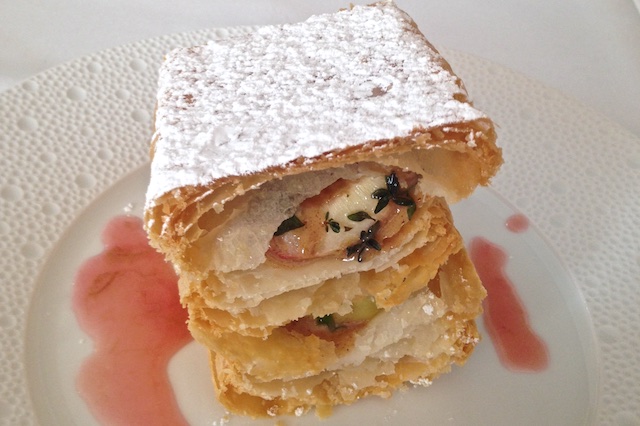
David: Upon arriving at L'Arpege I was taken aback by how unpretentious the vibe felt. I think people expect a three-star Michelin restaurant to be rigid and serious, but your place is the opposite: it's welcoming and relaxed. Was that by design, or is that just a natural extension of your personality?
Alain: I really like the fact our guests feel at home when they come to restaurant Arpège. In Paris, we are one of only three or four chefs to own our restaurant, our guests come to meet the chef like a friend. Haute cuisine can be served in a simple place, without gold leaf on the walls. The client can focus more on the plate! Luxury is more obvious in the palace hotels. I like when the tables are close together, it encourages discussion and creates a nice atmosphere. Clients can share their experience and it becomes a place of encounter.
David: I love that you actually come out and greet each table personally, taking the time to visit with each guest. That was one of the highlights of our meal. Do you do that during every single shift?
Alain: Absolutely! It is a way for me to thank our guests. I like to know who is in the restaurant, where do the guests come from, and if they are satisfied. It is important for me to listen to the needs of my clients so I can correct the situation if something is not to their taste!
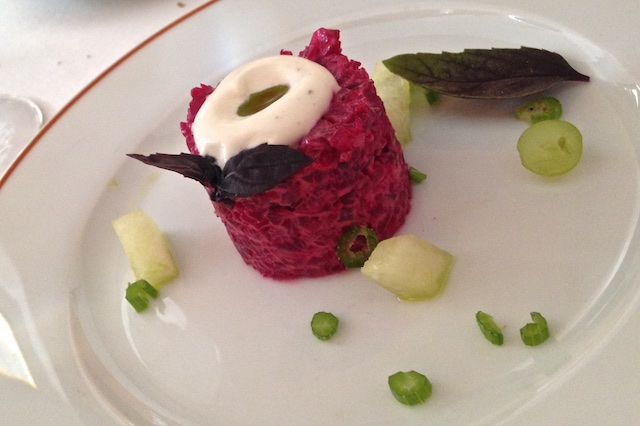
David: I think that type of customer-focused hospitality surprises people coming from someone as accomplished as yourself. The fact that, despite your renowned status as a chef, you're there to serve the needs of the guest. It's a lost sense of humility in today's food and wine world, I think. In 1996, you earned three stars for L'Arpege, but in 2001 you introduced a new vegetable-based menu that focused entirely on your own hand-grown produce. Where did the inspiration for that come from?
Alain: As you may know, I love painting and I've been making collages for almost twenty years. The inspiration comes from colors. They've made me a much more creative person!
David: What was the response from your clients and customers when you began making vegetables your focus? Were people surprised?
Alain: Curious people stayed, the others left!
David: It really is that simple, isn't it? I think one of my favorite aspects of our meal was how simply the food was presented and how easy it was to appreciate. I love it when experts in any field can take something that seems high-brow and intimidating, and turn it into something approachable and fun. What are your feelings about the presentation of food and what are your intentions when serving it?
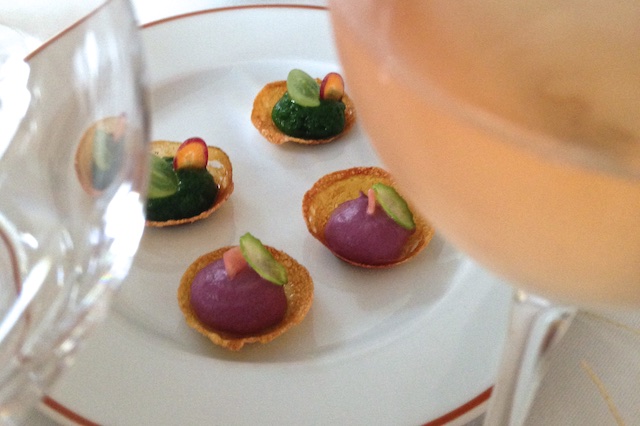
Alain: Easiest things are often the most difficult. This is my philosophy. I like simple things, and to own a garden makes things simpler. It brings you back to the earth and you learn to respect the seasons. While others are trying to cook four seasons at the same time, I only cook one!
David: What turns you off when you go out to eat? What inspires you personally as someone who appreciates food?
Alain: Restaurants where you can eat tomatoes all year round, or asparagus, peas, and strawberries at Christmas really turn me off. What inspires me is grace.
David: Everyone always assumes that I drink whiskey or high-end wine on a nightly basis, but after most shifts what I want is a cold beer. Is there a chef version of that, where maybe you go home after the end of a long day and crave a frozen, microwavable meal? What do you like to eat when you dine casually?
Alain: There is no chef version of that for me, I don't think. I feel so lucky to have my own gardens. I eat fresh and natural vegetables from my kitchen gardens every day regardless of the occasion.
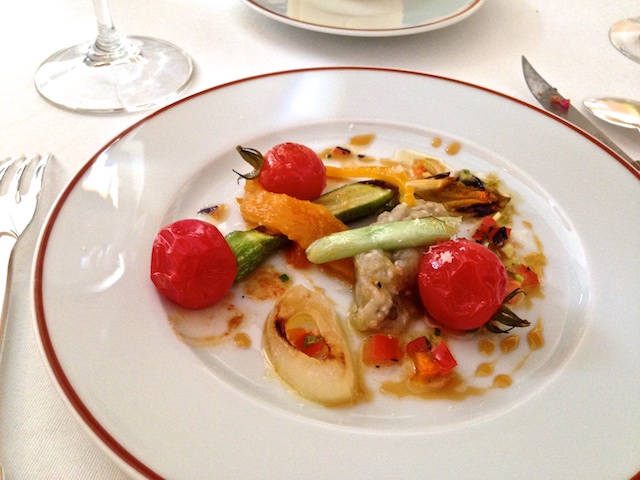
David: What's it like having a restaurant on the Top 25 list for the world? Do you find that customers sometimes have expectations that are out of whack with reality as a result?
Alain: Not really. When our guests enter the restaurant Arpège, they probably have been to a lot of other three-star restaurants, so it is normal they have an opinion on what they eat. It is like going to a concert when you love music, you’ll have an opinion about what you hear. As I said, it is important for me to listen to my guests. When they talk to me of temperatures or seasoning of a dish for instance, I can give their feedback to the kitchen and adjust my dish. Only failure serves to make us stronger, not success.
David: L'Arpege has an incredible wine list, and—as we talked about when I was there—I was stunned to find Edmond Vatan Sancerre. What do you look for when putting together a wine list for your restaurant?
Alain: I try to focus on winemakers who share with me the same spirit and values. A natural wine, often a white wine, as vegetables pair very well with white wine. Chenin and Riesling grapes are the best match for vegetables!
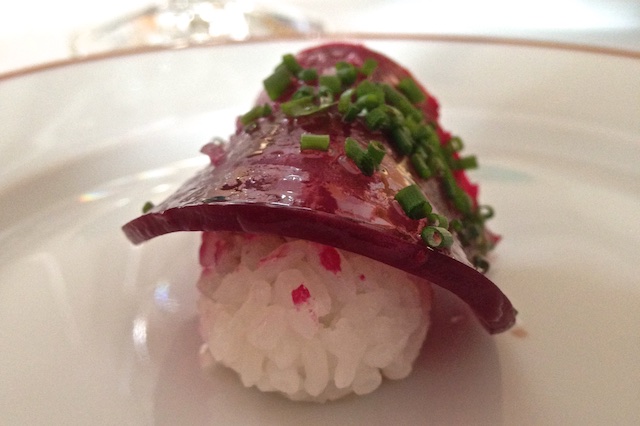
David: I'm so happy to hear you say that. I drink white wine almost every day and, to me, it's the most complex and food friendly drink in the world, yet most people think red is where the action is. You seem to really enjoy what you do, which is always a good sign for any business. While we were waiting to get in, I remember you telling a guy on the street to come inside so you could cook for him. What is it that pleases you the most about cooking?
Alain: You could ask the same question to a saxophonist and the answer would probably be the same. It is beautiful to play with your senses. It helps to be precise! Work with your hands, taste what you are cooking, smell the flavor, arrange a nice dish on a plate, make it an art form, listen to the flame sing, it is wonderful!
David: If you were on your death bed and you could only have one last meal before moving on into the afterlife, what would that meal be?
Alain: I would fast!
-David Driscoll
